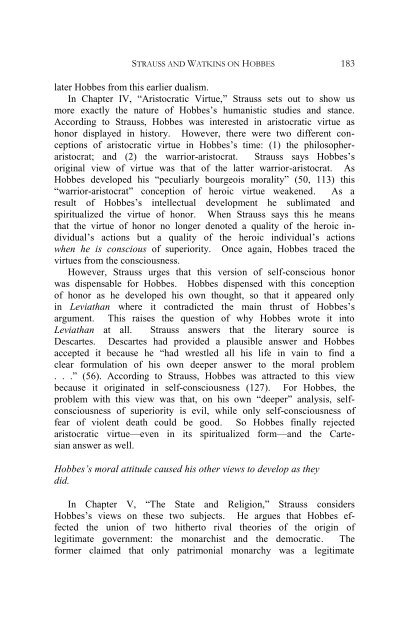Strauss and Watkins on Hobbes' Political Philosophy: A Review
Strauss and Watkins on Hobbes' Political Philosophy: A Review
Strauss and Watkins on Hobbes' Political Philosophy: A Review
You also want an ePaper? Increase the reach of your titles
YUMPU automatically turns print PDFs into web optimized ePapers that Google loves.
STRAUSS AND WATKINS ON HOBBES 183<br />
later Hobbes from this earlier dualism.<br />
In Chapter IV, “Aristocratic Virtue,” <str<strong>on</strong>g>Strauss</str<strong>on</strong>g> sets out to show us<br />
more exactly the nature of Hobbes’s humanistic studies <str<strong>on</strong>g>and</str<strong>on</strong>g> stance.<br />
According to <str<strong>on</strong>g>Strauss</str<strong>on</strong>g>, Hobbes was interested in aristocratic virtue as<br />
h<strong>on</strong>or displayed in history. However, there were two different c<strong>on</strong>-<br />
cepti<strong>on</strong>s of aristocratic virtue in Hobbes’s time: (1) the philosopher-<br />
aristocrat; <str<strong>on</strong>g>and</str<strong>on</strong>g> (2) the warrior-aristocrat. <str<strong>on</strong>g>Strauss</str<strong>on</strong>g> says Hobbes’s<br />
original view of virtue was that of the latter warrior-aristocrat. As<br />
Hobbes developed his “peculiarly bourgeois morality” (50, 113) this<br />
“warrior-aristocrat” c<strong>on</strong>cepti<strong>on</strong> of heroic virtue weakened. As a<br />
result of Hobbes’s intellectual development he sublimated <str<strong>on</strong>g>and</str<strong>on</strong>g><br />
spiritualized the virtue of h<strong>on</strong>or. When <str<strong>on</strong>g>Strauss</str<strong>on</strong>g> says this he means<br />
that the virtue of h<strong>on</strong>or no l<strong>on</strong>ger denoted a quality of the heroic in-<br />
dividual’s acti<strong>on</strong>s but a quality of the heroic individual’s acti<strong>on</strong>s<br />
when he is c<strong>on</strong>scious of superiority. Once again, Hobbes traced the<br />
virtues from the c<strong>on</strong>sciousness.<br />
However, <str<strong>on</strong>g>Strauss</str<strong>on</strong>g> urges that this versi<strong>on</strong> of self-c<strong>on</strong>scious h<strong>on</strong>or<br />
was dispensable for Hobbes. Hobbes dispensed with this c<strong>on</strong>cepti<strong>on</strong><br />
of h<strong>on</strong>or as he developed his own thought, so that it appeared <strong>on</strong>ly<br />
in Leviathan where it c<strong>on</strong>tradicted the main thrust of Hobbes’s<br />
argument. This raises the questi<strong>on</strong> of why Hobbes wrote it into<br />
Leviathan at all. <str<strong>on</strong>g>Strauss</str<strong>on</strong>g> answers that the literary source is<br />
Descartes. Descartes had provided a plausible answer <str<strong>on</strong>g>and</str<strong>on</strong>g> Hobbes<br />
accepted it because he “had wrestled all his life in vain to find a<br />
clear formulati<strong>on</strong> of his own deeper answer to the moral problem<br />
. . .” (56). According to <str<strong>on</strong>g>Strauss</str<strong>on</strong>g>, Hobbes was attracted to this view<br />
because it originated in self-c<strong>on</strong>sciousness (127). For Hobbes, the<br />
problem with this view was that, <strong>on</strong> his own “deeper” analysis, self-<br />
c<strong>on</strong>sciousness of superiority is evil, while <strong>on</strong>ly self-c<strong>on</strong>sciousness of<br />
fear of violent death could be good. So Hobbes finally rejected<br />
aristocratic virtue—even in its spiritualized form—<str<strong>on</strong>g>and</str<strong>on</strong>g> the Carte-<br />
sian answer as well.<br />
Hobbes’s moral attitude caused his other views to develop as they<br />
did.<br />
In Chapter V, “The State <str<strong>on</strong>g>and</str<strong>on</strong>g> Religi<strong>on</strong>,” <str<strong>on</strong>g>Strauss</str<strong>on</strong>g> c<strong>on</strong>siders<br />
Hobbes’s views <strong>on</strong> these two subjects. He argues that Hobbes ef-<br />
fected the uni<strong>on</strong> of two hitherto rival theories of the origin of<br />
legitimate government: the m<strong>on</strong>archist <str<strong>on</strong>g>and</str<strong>on</strong>g> the democratic. The<br />
former claimed that <strong>on</strong>ly patrim<strong>on</strong>ial m<strong>on</strong>archy was a legitimate
















